Rosemary Oil for Facial Hair Growth

Facial hair growth is a topic of interest for many men looking to enhance their appearance. While numerous products on the market promise thicker and fuller facial hair, one natural remedy that has gained popularity is rosemary oil.
But before diving into the benefits of rosemary oil, let’s look into and compare a popular over-the-counter option medication called Minoxidil in Rogaine.
Minoxidil is a topical medication approved by the FDA for treating hair loss. It is available over the counter and is commonly found in products like Rogaine. Minoxidil works by prolonging the growth phase of hair follicles, promoting hair regrowth, and slowing down hair loss.
Comparing Rosemary Oil vs Minoxidil
When it comes to choosing between rosemary oil and minoxidil, several factors come into play:
Efficacy
Minoxidil has more robust scientific backing and is FDA-approved for hair loss treatment. However, some studies have shown promising results in rosemary oil, a natural alternative for those who prefer holistic treatments.
Side Effects
Minoxidil can cause side effects such as scalp irritation, dryness, and unwanted facial hair growth in some cases. Rosemary oil is generally well-tolerated but may cause allergic reactions in some individuals.
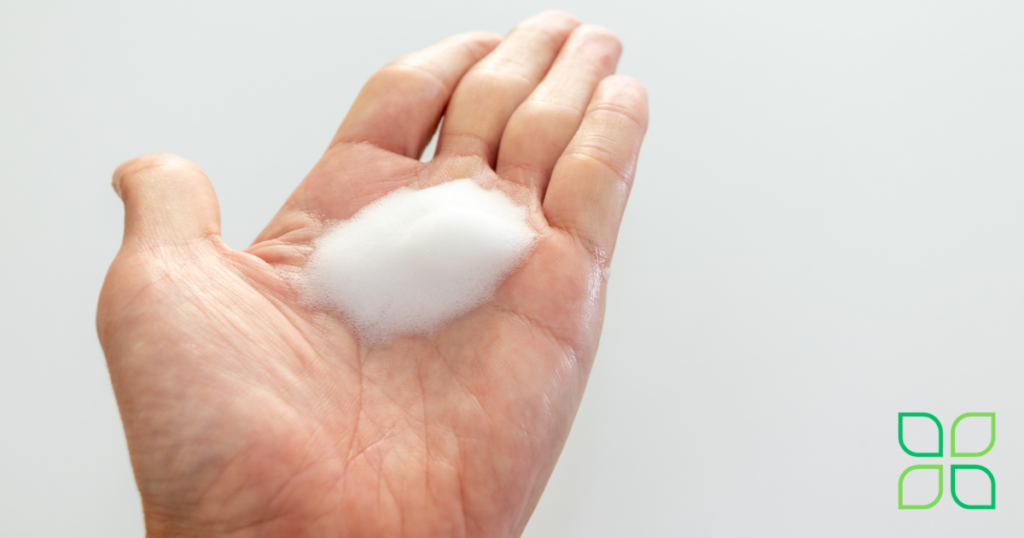
Cost
Minoxidil products can become costly, especially when used long-term. Rosemary oil is often more affordable and can be easily incorporated into your existing hair care routine.
Natural is the winner
Both rosemary oil and minoxidil have their merits in promoting hair growth. Minoxidil is a clinically proven, FDA-approved treatment with a higher success rate. However, rosemary oil offers a natural, cost-effective alternative with additional benefits for scalp health.
This essential oil, extracted from the leaves of the rosemary plant, is known for its numerous health benefits, including promoting beard hair growth.
Exploring Rosemary Oil as Your Hair Growth Solution
Now, let us take a deep dive and explore the benefits of rosemary oil for facial hair growth, how to use it effectively, and some tips to maximize its effectiveness. Read on to discover how this natural remedy can help you achieve your desired facial hair.
Benefits of Rosemary Oil for Facial Hair Growth
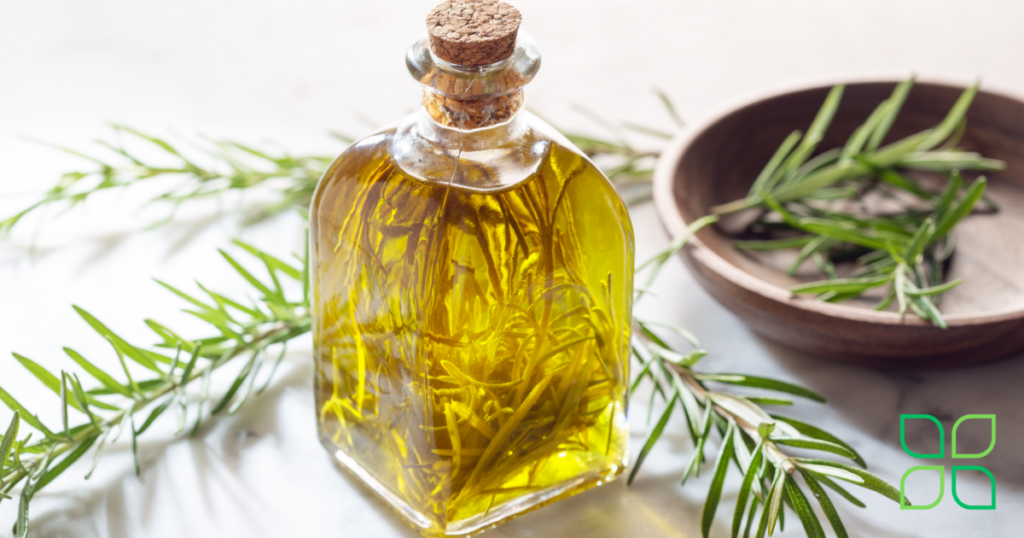
When it comes to optimizing hair health, we often overlook the potent, natural remedies hidden in plain sight. One such underappreciated gem is rosemary oil. Packed with many nutrients and antioxidants, this herbal oil can be the best way to improve hair health.
The Nutrient Profile of Rosemary Oil
First, let’s delve into the nutrient profile of rosemary oil. This essential oil is rich in vitamins such as A, C, and B-complex, all of which play a crucial role in maintaining the health and vitality of your hair. Vitamin A helps in the production of sebum, keeping your scalp moisturized. Vitamin C is an antioxidant that combats oxidative stress, which can lead to hair aging and damage. B-complex vitamins, including B6 and B12, support cell regeneration and the formation of red blood cells, essential for hair growth.
Antioxidants: The Unsung Heroes
Antioxidants are another critical component of rosemary oil. They neutralize free radicals, which can damage hair follicles and impede growth. The primary antioxidants in rosemary oil are carnosic acid and rosmarinic acid. These compounds have been shown to protect against cellular damage and inflammation, creating a healthier environment for hair growth.
Boosting Circulation and Hair Growth
One of the most compelling benefits of rosemary oil is its ability to improve blood circulation. Enhanced blood flow to the scalp ensures that hair follicles receive an adequate supply of nutrients and oxygen, promoting growth. A study published in the journal “SKINmed” found that individuals using rosemary oil experienced a significant increase in hair count after six months of application, comparable to the effects seen with minoxidil, a commonly prescribed hair growth treatment.
Reducing Dandruff and Scalp Irritation
Rosemary oil’s anti-inflammatory and antimicrobial properties effectively combat dandruff and soothe scalp irritation. These properties help maintain scalp health, which is foundational for strong, healthy hair. Regular use of rosemary oil can help reduce flakiness and itching, creating a more favorable environment for hair growth.

Now that we understand the nutritional profile of rosemary oil, here are some of the key benefits of using rosemary oil for facial hair growth:
Stimulates Hair Follicles
One of the primary benefits of rosemary oil is its ability to stimulate hair follicles. The oil contains ursolic acid, which has been shown to increase blood circulation to the scalp and hair follicles. This increased blood flow can promote new hair growth and strengthen existing hair.
Reduces Hair Loss
Rosemary oil has been found to reduce hair loss by blocking the effects of dihydrotestosterone (DHT), a hormone that can cause hair follicles to shrink and eventually stop producing hair. By inhibiting DHT, rosemary oil can help prevent hair loss and promote the growth of thicker, fuller facial hair.
Anti-Inflammatory Properties
Inflammation of the hair follicles can impede hair growth. Rosemary oil has anti-inflammatory properties that can help soothe and reduce inflammation, creating a healthier environment for hair growth.
Antimicrobial Effects
The antimicrobial properties of rosemary oil can help keep the skin and hair follicles clean and free from bacteria and fungi. This can prevent infections and conditions that could hinder hair growth.
How to Use Rosemary Oil for Facial Hair Growth
Using rosemary oil for facial hair growth is simple and can be easily incorporated into your daily grooming routine. Here are some methods to try:
Direct Application
One of the most straightforward ways to use rosemary oil is to apply it directly to your facial hair and skin. Here’s how:
1. To avoid skin irritation, Dilute a few drops of rosemary oil with a carrier oil, such as coconut or jojoba oil.
2. Gently massage the oil mixture into your facial hair and the skin beneath it.
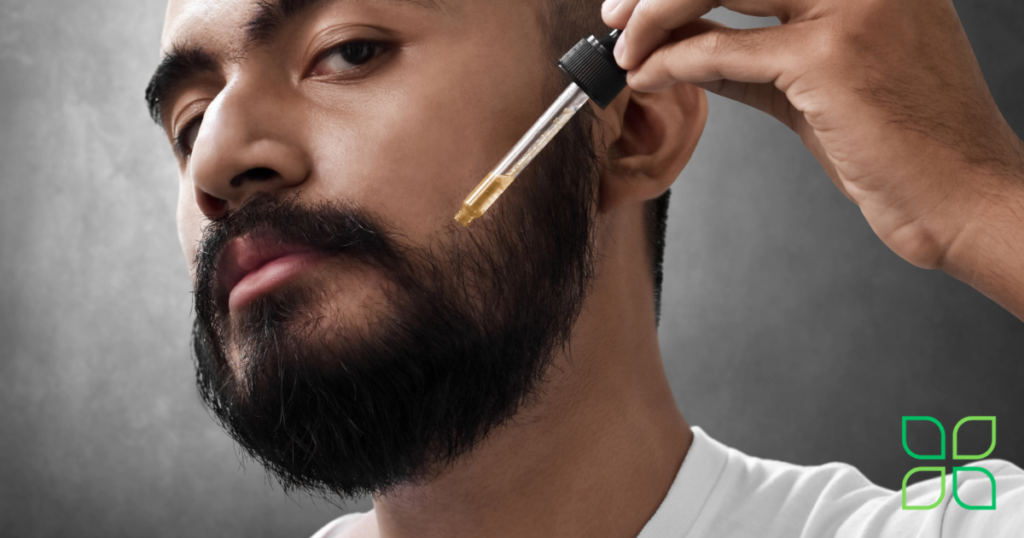
3. Leave it on for at least 30 minutes before rinsing off with warm water.
4. Repeat this process 2-3 weekly for best results.
Adding to Your Beard Oil
If you already use beard oil, adding rosemary oil can enhance its effectiveness. Simply add a few drops of rosemary oil to your beard oil bottle and shake well before each use. Apply the beard oil as you usually would to condition and nourish your facial hair while promoting growth.
Rosemary Oil Infused Beard Balm
If you prefer using a beard balm, make your own rosemary oil-infused beard balm at home. Here’s a simple recipe:
Ingredients:
– 1 tablespoon of beeswax
– 1 tablespoon of shea butter
– 1 tablespoon of coconut oil
– 5-10 drops of rosemary oil
Instructions:
1. Melt the beeswax, shea butter, and coconut oil together in a double boiler.
2. Remove from heat and allow to cool slightly.
3. Add the rosemary oil and stir well.
4. Pour the mixture into a small container and let it solidify.
5. Use the beard balm as needed to style and nourish your facial hair.
Tips for Maximizing the Effectiveness of Rosemary Oil
While rosemary oil can be highly effective in promoting facial hair growth, there are a few additional tips to keep in mind to maximize its benefits:
Consistency is Key

Like any hair growth treatment, consistency is crucial. Use rosemary oil regularly and give it time to work. Results may take a few weeks to become noticeable, so be patient and persistent.
Maintain a Healthy Diet
A healthy diet rich in vitamins and minerals is essential for hair growth. Ensure you are getting enough protein, vitamins A, C, D, and E, zinc, and biotin. These nutrients can support healthy hair growth from the inside out.
Avoid Harsh Chemicals
Harsh chemicals in grooming products can damage your facial hair and skin. Opt for natural and gentle products to avoid irritation and promote healthy hair growth.
Stay Hydrated
Hydration is essential for overall health, including hair health. Drink plenty of water daily to keep your skin and hair hydrated and healthy.
Having Options is Key to Finding the Best Solution for You
Not everyone may see the benefits outlined here with Rosemary oil. The good news is that there are other options. As a bonus, here are some additional oils that are considered the best essential oils to grow hair:
Thyme Oil
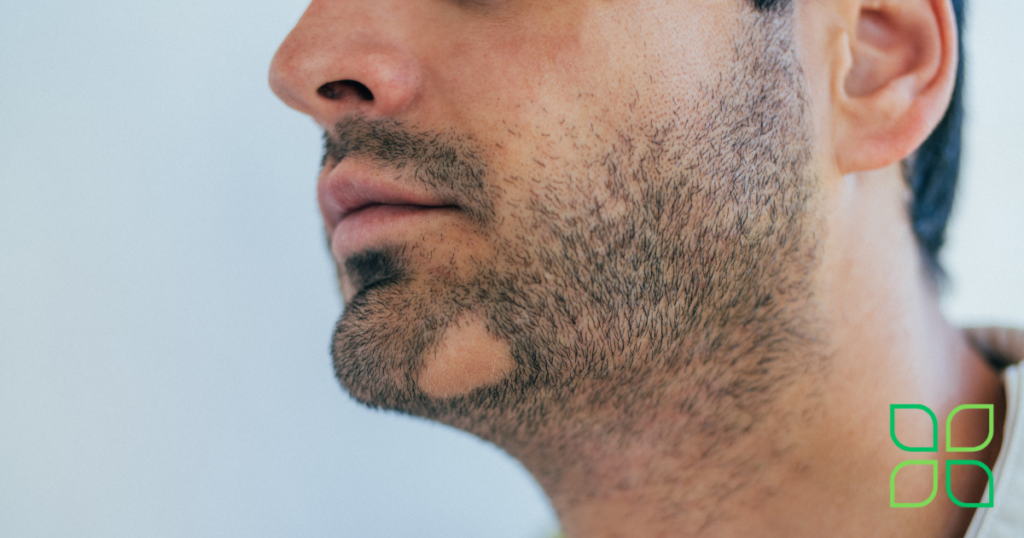
The reason thyme may play a role is that it can promote hair growth by stimulating the scalp and treating alopecia areata, which is that patchy baldness that can occur. A randomized trial looked at 86 people over seven months, with essential oils (thyme, rosemary, which we mentioned, lavender, and cedarwood) mixed in a mixture of carrier oils: jojoba and grapeseed, and the scientific evidence found the results to be safe and effective. The thing with these carrier oils is that because essential oils are so strong on their own, it is best to dilute them with a carrier oil so you can cover a larger surface area without needing to use too much.
Pumpkin Seed Oil
A significant study about pumpkin seed oil and hair loss was published in 2014. It found that pumpkin seed oil blocks the action of 5-alpha reductase and has antiandrogenic effects on rats. In 2019, a study on pumpkin seed oil as a topical hair growth-promoting agent showed that it is a promising alternative for treating male pattern alopecia.
Vitamin E oils
Vitamin E oil is known to enhance hair growth by improving blood circulation to the hair follicles, keeping the skin hydrated, preventing dryness and flakiness, helping neutralize free radicals, which can damage hair follicles and impede hair growth, soothing the skin and reducing inflammation, and creating a conducive environment for hair growth.
Cedarwood oil
When cedarwood oil is applied to the skin, provide better blood circulation, which helps deliver essential nutrients to the hair follicles. This can result in stronger and thicker facial hair over time.
Cedarwood oil helps balance sebum production, ensuring that your skin remains neither too oily nor too dry. Excessive sebum production can clog hair follicles and inhibit growth, so this balance is crucial for maintaining healthy hair follicles and promoting growth.
Avocado Oil
In recent years, avocado oil has gained popularity not only as a cooking ingredient but also as a beneficial addition to skincare and haircare routines. One of the lesser-known uses of avocado oil is its potential to promote facial hair growth.
Avocado oil is rich in essential fatty acids, vitamins, and antioxidants, making it a versatile and nourishing oil. Its high concentration of oleic acid, a monounsaturated fatty acid, gives avocado oil its moisturizing and anti-inflammatory properties. It also contains vitamins A, D, and E, known for their skin and hair benefits.
Peppermint Oil
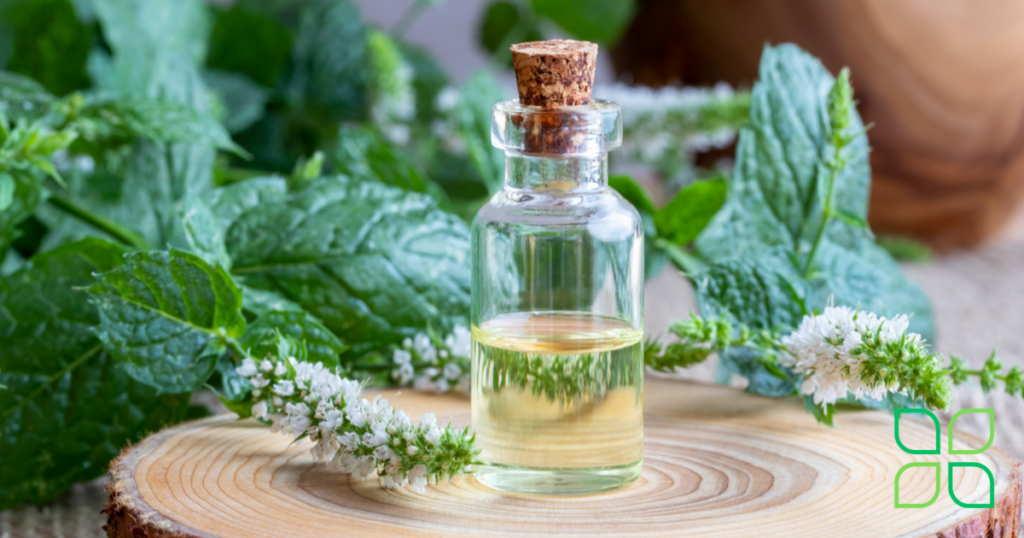
Research suggests that peppermint oil can promote hair growth by stimulating blood circulation to the hair follicles. When applied to the skin, the menthol in peppermint oil causes blood vessels to dilate, increasing the flow of oxygen and nutrients to the hair roots. This enhanced circulation can help to nourish the hair follicles, encouraging more robust and healthier hair growth. Additionally, peppermint oil’s antimicrobial properties can help to keep the skin clean and free from infections that could hinder hair growth.
Tea Tree Oil
Tea tree oil’s antiseptic properties help maintain clean and clear skin, reducing the risk of acne and other skin issues that can impede hair growth.
Tea tree oil also has cleansing properties that help unclog pores and hair follicles, creating an optimal environment for hair growth.
Tea tree oil’s anti-inflammatory properties can soothe irritated skin, potentially promoting a healthier environment for facial hair to flourish.
Lastly, tea tree oil helps moisturize the skin and reduce beard dandruff, ensuring the hair follicles are well-nourished and capable of producing healthy hair.
Castor oil
Castor oil is a vegetable oil obtained from the seeds of the Ricinus communis plant. It has been used for centuries for its medicinal and therapeutic properties. Castor oil contains essential nutrients, including vitamin E, proteins, omega-6, and omega-9 fatty acids. These nutrients nourish the hair follicles, promoting healthier and stronger hair growth.
Massaging castor oil into the skin can improve blood circulation, ensuring that the hair follicles receive ample nutrients and oxygen, which are crucial for hair growth.
The antimicrobial properties of castor oil help keep the skin clean and free from infections, which can hinder hair growth.
Castor oil has excellent moisturizing properties, preventing dryness and flakiness that can impede hair growth.
Lavender oil
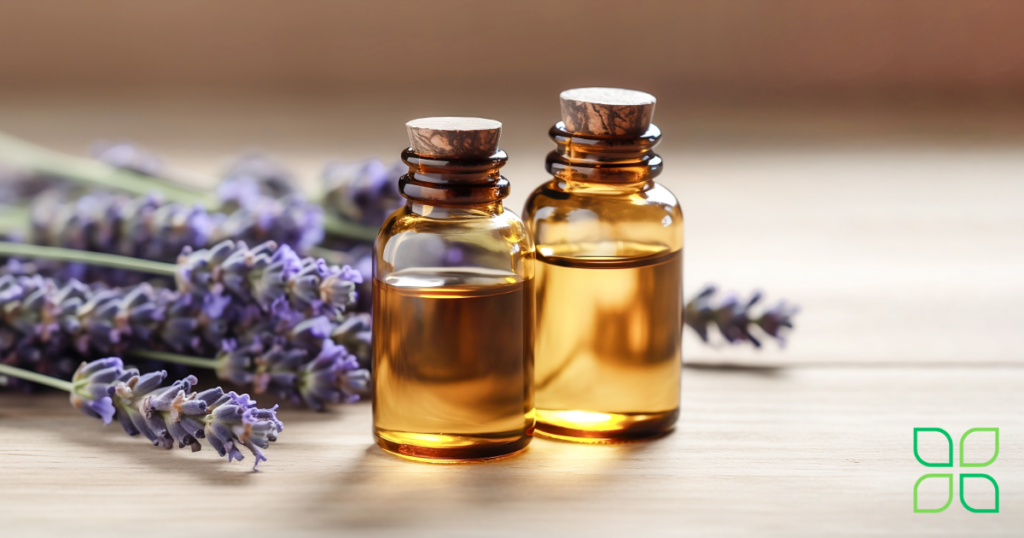
Lavender oil can promote hair growth by increasing blood circulation and providing essential nutrients to hair follicles. A study published in the journal “Toxicological Research” found that lavender oil applied to the skin of mice resulted in significant hair growth. While more research is needed to confirm these human findings, the results are promising.
Conclusion
Rosemary oil is a natural and effective remedy for promoting facial hair growth. Its ability to stimulate hair follicles, reduce hair loss, and provide anti-inflammatory and antimicrobial benefits makes it a valuable addition to your grooming routine. Consistently using rosemary oil and following the tips outlined in this blog post can achieve the thicker, fuller facial hair you desire.
Give rosemary oil a try and see the results for yourself. With patience and dedication, you may find that this natural remedy enhances facial hair growth.
